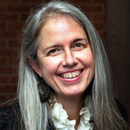Rooting their faith in experience and the Scriptures

Daily Scripture
Luke 24:36-45
36 While they were saying these things, Jesus himself stood among them and said, “Peace be with you!” 37 They were terrified and afraid. They thought they were seeing a ghost.
38 He said to them, “Why are you startled? Why are doubts arising in your hearts? 39 Look at my hands and my feet. It’s really me! Touch me and see, for a ghost doesn’t have flesh and bones like you see I have.” 40 As he said this, he showed them his hands and feet. 41 Because they were wondering and questioning in the midst of their happiness, he said to them, “Do you have anything to eat?” 42 They gave him a piece of baked fish. 43 Taking it, he ate it in front of them.
44 Jesus said to them, “These are my words that I spoke to you while I was still with you—that everything written about me in the Law from Moses, the Prophets, and the Psalms must be fulfilled.” 45 Then he opened their minds to understand the scriptures.
Daily Reflection & Prayer
After realizing Jesus was alive, the two disciples rushed to Jerusalem to tell the news. As they spoke, Jesus “stood among them.” Luke, a first-century physician (cf. Colossians 4:14), noted details that showed Jesus was alive in the flesh. “24:43 he took it and ate it. Many Jewish sources doubted that angels [or ghosts] ate human food.” * As at Emmaus, Jesus rooted their faith firmly in Scriptures they’d struggled to understand when he’d shared them (cf. Luke 18:31, 22:37), not just in seeing him.
- Pastor Bruce Larson noted that Luke was “familiar with the Greek philosophy that the body and its appetites were evil. The soul and mind were good. The Greeks believed that in death the mind and spirit were freed from their bondage to the body…. Luke, in spite of his Greek background, underscored the Hebrew theology… of the unity of body, mind, and soul.” * Later the Apostles’ Creed said, “I believe in the resurrection of the body.” Do you believe in that, and count on it?
- “There are two ways to look at human history. One way is to focus on the wars and violence, the squalor, the pain and tragedy and death…. If I take Easter as the starting point, the one incontrovertible fact about how God treats those whom he loves, then human history becomes the contradiction and Easter a preview of ultimate reality. Hope then flows like lava beneath the crust of daily life.” *** Do you choose violence, squalor and pain as ultimately real, or the hope flowing from Jesus’ resurrection?
Prayer
Lord Jesus, you went where most of us most dread going—the realm of death—and came forth victorious! Help me claim your victory, and live and die in calm trust in your eternal love and life. Amen.
GPS Insights

Dr. Amy Oden
Dr. Amy Oden is Professor of Early Church History and Spirituality, teaching at several seminaries. Teaching is her calling, and she looks forward to every day with students. Her latest book (Right Here, Right Now: The Practice of Christian Mindfulness, Abingdon Press, 2017) traces ancient mindfulness practice for Christians today.
Bodies. These verses (Luke 24:36-45) are full of body-talk. “Look at my hands and feet,” “Touch me,” “flesh and bones,” “Do you have anything to eat?” There’s no “the-body-is-just-a-shell-that-doesn’t-matter-but-the-spirit-lives-on.” That’s Plato, not Jesus.
We’ve been confused and downright heretical about bodies at times in the church. We have dismissed, de-valued and even destroyed bodies. This body-denying is not biblical, and we subscribe to it at our peril. The good news is that the Word was made flesh in a human body! Flesh! There’s no higher endorsement of the human body than the Incarnation itself.
And it doesn’t stop there. Jesus’ whole ministry focuses on human bodies that need healing, visibility, mercy. He encounters bodies that are hurting, diseased, bleeding, bent, weakened, deranged or weary and takes them seriously. Eating and drinking, a basic body need, are central to Jesus’ ministry, table fellowship with friends. Later in Jerusalem, after his resurrection, Jesus shows up to his disciples fully present in a body. He asks to eat, bringing attention to his concrete physical body.
Jesus’ clear affirmation of his own body in Luke 24 is an invitation to reconnect with our own. Our bodies are a place God speaks to us most deeply, in our sensations, emotions and neural networks. In a sense, the Word is made flesh in our very bodies. Paying attention to our bodies, to our sensations and feelings can lead to greater intimacy with God, to deeper faith and discipleship.
One way to start reconnecting with your body is by focusing on your breathing. Take 4 or 5 slow, deep breaths and notice the oxygen as it fills your lungs and you release it. Then intentionally become aware of different parts of your body, any sensations or feelings they carry. Last, pay close attention to your heart or your gut, noticing sensations, feelings or insights resting there. Let your body speak to you. What wisdom does it offer?
Offer a prayer of gratitude for your breath and body today.
© 2026 Resurrection: A United Methodist Church. All Rights Reserved.
Scripture quotations are taken from The Common English Bible ©2011. Used by permission. All rights reserved.
References
* Zondervan, NIV, Cultural Backgrounds Study Bible, eBook (Kindle Locations 234651-234653).
** Bruce Larson, The Preacher’s Commentary Series, Volume 26: Luke. Nashville: Thomas Nelson Inc. 1983, pp. 354-355.
*** Phillip Yancey, The Jesus I Never Knew. Grand Rapids, MI: The Zondervan Publishing Company, 1995, pp. 219-220.